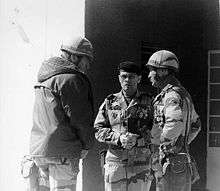Bernard Janvier

Bernard Janvier (born 16 July 1939) is a French general. He was commander of the Division Daguet during First Gulf War, and UNPROFOR in charge of peacekeeping during the Bosnian War.
Life
He was admitted to the Joint Military school Coëtquidan on 1 October 1958, as Saint-Cyr. He performed the internship application to the School of the Infantry at Camp des Garrigues in Nîmes from 15 September 1960.
On 1 December 1960, he joined the Center for Executive Development Infantry #2 in Philippeville in Algeria, then it is assigned with effect from 1 January 1961 to the 1st battalion of the 1st regiment of riflemen as a commando leader.
Assigned to the 1st Regiment, Foreign Legion during the month of July 1962, he was transferred on 1 August 1962 the 2nd Foreign Parachute Regiment (2e REP) regiment with whom he is living in North Africa from August 1962 to September 1964. From 1964 to 1967, he served in Madagascar and the Comoros in the 3rd foreign Infantry regiment, successively as adjutant in combat units and as staff officer to the body.
He was promoted to captain on 1 January 1967. Repatriated, he attended the captains at the School of the Infantry in Montpellier, then joined the 33rd promotion of school staff as trainee, from 1 December 1968.
He led from 1968 to 1970, a company of the 9th Regiment Airborne Infantry, then from 1970 to 1972, a company active cadets to Military Academy at St. Cyr. Thereafter, he served in the school, the deputy chief functions during general information and general military training for two years. Intern of the 88th promotion War College, September 1974 to May 1976, he served at the end, from June 1976 to August 1978, as a case officer in the office "personal staff" of the Staff army. It is the battalion commander of 1 October 1974.
Successively head of the "operations - instruction" office, then commander of the 2nd REP, of August 1978 to September 1981, he participated in "Operation Pout" in Chad as commander of the Joint Group "Phoenix", November 1979 to April 1980. He received his stripes lieutenant colonel on 1 October 1978.
In 1981, he was assigned as a staff officer to the General Inspectorate of the Army. Designated as commanding officer of the 2nd REP in Calvi, in 1982, he participated at the head of the regiment to "Operation Killer" as part of the multinational security force from August to September 1982 in Beirut.
He was promoted to colonel on 1 October 1982. He participated in "Operation Manta" in Chad, as commander of the Joint Group from January to May 1984.
From 1984 to 1987, he served as Head of the "personal" section, then head of those "numbers - personal" office in the headquarters of the army. On 1 August 1987, he was deputy general commanding the 6th Light Armored Division (6th DLB), Nîmes and 1 March 1988, he was admitted in the 1st section of the general officers.
On 1 July 1989, he was head of the division "organization - logistics" to the staff of the armies. In May 1990, he commanded the "Shark" operation in Port-Gentil in Gabon.
From 7 February to 30 April 1991, he commanded the division Brocket in Saudi Arabia. As such, he has under his command 4,300 American soldiers. He was promoted to major general on 1 April 1991. General Roquejoffre, commander of the operation Brocket and General Janvier at As Salman (Iraq) 10 March 1991.
On 1 May 1991, he was appointed special advisor to the Chief of General Staff of the Army before taking command of the 6th DLB, in Nîmes, from 1 June 1991 to 5 September 1993. He was appointed Head of Joint Staff operational planning, effective 6 December 1993. It is then raised to the rank and title of General of the Army Corps, on 1 July 1994.
On 1 February 1995, he was made available to the Chief of Staff of the Army and received on 1 March 1995, the command of the peacekeeping force of the United Nations for the former Yugoslavia and simultaneously, he served as second in command of the force development implementation of the peace plan in Bosnia (IFOR).
At the end of the mission, he was made available to the Chief of Staff of the Army, 19 February 1996. In July 1996 he was appointed Member of the Supreme Council of the Army.
On 1 September 1996, he was appointed director of the Institute of Advanced Studies for National Defence (IHEDN) and the center of Advanced Military Studies (CHEM). He received his fifth star on 1 July 1998, and joined the 2nd section of the general officers on 1 January 1999.
Controversy
He opposed the use of airpower in Yugoslavia.[1] On 16 November 1995, the International Association for the Prevention of Genocide, Crimes Against Humanity and War Crimes (AICG) applied to indict General Janvier for:
"repeatedly and systematically impeding the necessary assistance to protect both the safe area of Srebrenica and the populations present there since 1992"[2]
and, for failing to support the Dutch peacekeeping forces[3] that were stationed around Srebrenica.[4]
References
- ↑ "French general's deal ensured massacre in Bosnia Hostage situation led to pact with Serbs". Newsday. May 30, 1996. Retrieved 16 July 2014.
- ↑ "AICG call to indict General Janvier". Bosnian Institute. Retrieved 1 May 2013.
- ↑ "Stage 4 - Tracks Peacekeepers". columbia.edu. Retrieved 1 May 2013.
- ↑ "Mladic trial revives questions over Dutch troops Mladic trial revives questions over Dutch troops". Euronews. Retrieved 1 May 2013.